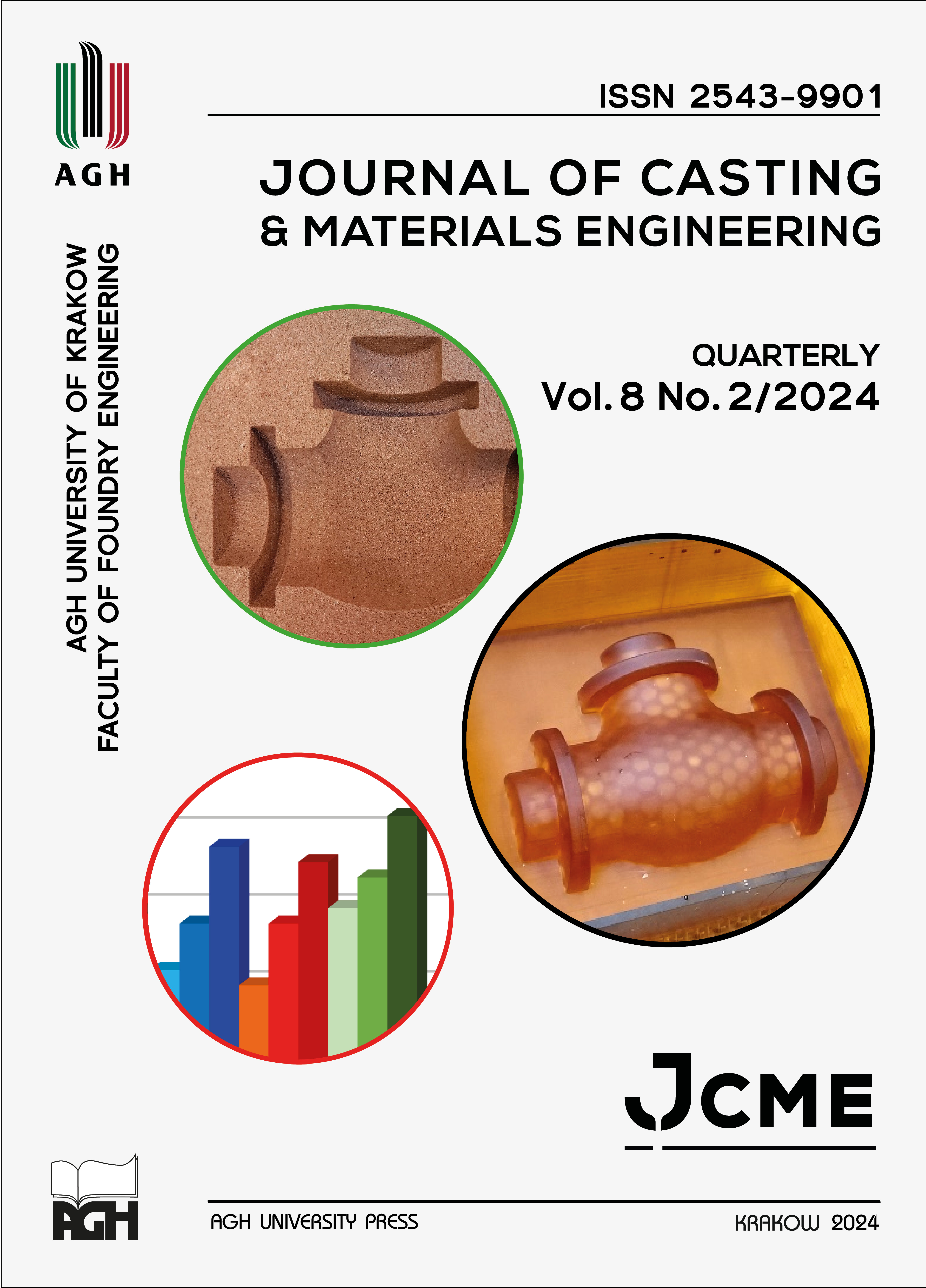New Pro-ecological Alkyd Binder for Moulding Sands with Limited Solvent Content
DOI:
https://doi.org/10.7494/jcme.2024.8.2.19Keywords:
pro-ecological moulding sand, innovative binder, alkyd binder, solvent content, properties of moulding sandAbstract
Moulding sands with an alkyd binder are used primarily in the production of massive castings, mainly of cast steel, but they can also be used for castings made of other alloys. Moulding sands with an alkyd binder compete with self-hardening sands with phenolic and furfuryl resins. They have several advantages in common with furan moulding sands, such as excellent knock-out properties and very good quality of the casting surface. Additionally, alkyd moulding sands do not contain nitrogen, sulphur, formaldehyde and water, various sands can be used as a matrix: quartz, chromite, zircon or olivine and a high proportion of reclaimed material (up to 90%), moreover the moulding sand has high plasticity. The disadvantages of this technology include limited ability to adjust the hardening time, high binder viscosity and high sensitivity of the moulding sand to the matrix and the ambient humidity.
The Prec-Odlew company is a Polish manufacturer of, among others, alkyd resins for the foundry industry. As part of the project: “Development and implementation of technologies for obtaining ecological binders (systems) for bonding highly refractory ceramic materials” (RPMP.01.02.01-12-0636/18) two new alkyd resins were developed with a reduced amount of solvents: SL2017 and SL2019. So far, resins of this type contained approximately 40–50% of solvents, including aromatic ones. The newly developed resins have a reduced amount of solvents in their composition – they contain from 20% to 30% and mainly non-aromatic solvents. The SL 2019 resin contains solvents that do not include any aromatic compounds in the form of hydrocarbons.
This article presents the results of testing the properties of moulding sands using the standard alkyd resin and the newly developed resins. The obtained results confirmed the possibility of making moulding sands with innovative binders, and even higher strength values were observed than in the case of the reference moulding sand with the SL 2002 binder.
Downloads
References
Polyesters – alkyd resins. Retrieved from: https://pre-epodreczniki.open.agh.edu.pl/ [accessed: 23.11.2023].
Final project report No.: RPMP.01.02.01-12-0636/18 under the leadership of Prof. Stanisław M. Dobosz DSc. PhD. Eng., Prec-Odlew Sp. z o.o.
Mhamane D.A., Rayjadhav S.B. & Shinde V.D. (2018). Analysis of chemically bonded sand used for molding in foundry. Asian Journal of Science and Applied Technology, 7(1), 11–16. Doi: https:// doi.org/10.51983/ajsat-2018.7.1.1025.
Major-Gabryś K. (2019). Environmentally friendly foundry molding and core sands. Journal of Materials Engineering and Performance, 28, 3905–3911. Doi: https://doi.org/10.1007/s11665-019-03947-x.
Lewandowski J.L. (1997). Tworzywa na formy odlewnicze. Kraków: Wydawnictwo AKAPIT.
Major-Gabryś K. (2016). Odlewnicze masy formierskie i rdzeniowe przyjazne dla środowiska. Katowice-Gliwice: Archives of Foundry Engineering.
Holtzer M., Dańko R., Żymankowska-Kumon S., Kubecki M. & Bobrowski A. (2016). Assessment of the harmfulness of moulding sands with alkyd resin subjected to the high temperature influence. Archives of Metallurgy and Materials, 61(4), 2171–2176. Doi: https://doi.org/10.1515/amm-2016-0346.
Mocek J. (2019). Multiparameter assessment of the gas forming tendency of foundry sands with alkyd resins. Archives of Foundry Engineering, 19(2), 41–48. Doi: https://doi.org/10.24425/afe.2019.127114.
Gutowski W.S. & Błędzki A.K. (2021). Fast-setting permeable alkyd/polyester composites: Moulding sands. Polymers, 13(24), 4386. Doi: https://doi.org/10.3390/polym13244386.
Downloads
Published
Issue
Section
License
Copyright (c) 2024 Stanisław M. Dobosz, Jan Kozień, Dariusz Drożyński, Małgorzata Hosadyna-Kondracka

This work is licensed under a Creative Commons Attribution 4.0 International License.
How to Cite
Accepted 2024-04-23
Published 2024-05-27


